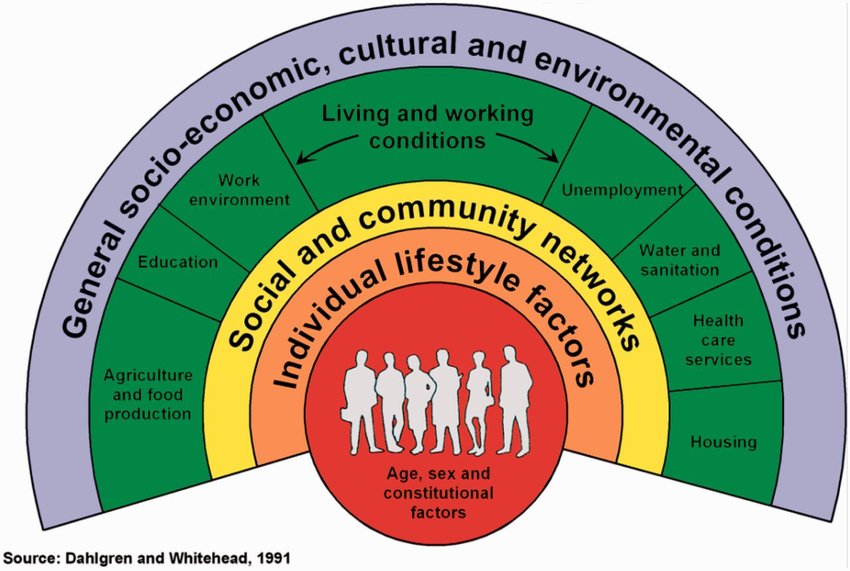|
Getting your Trinity Audio player ready...
|
Working on the frontlines to make trauma-informed decisions and to work in ways that support mental health and well-being does not happen exclusively in the direct interactions between career practitioners and their clients. Committing to work in trauma-informed ways invites us to take a broader perspective – a systems perspective; otherwise, our efforts can be easily undone and trauma can be further amplified by oppression, bias and stigma in the system.
The ecosystem career practitioners work within includes direct interactions with clients, their organization, the organizations they refer to, professional associations and funders. It includes many social, economic and political factors as outlined in the social determinants of mental health and well-being seen below.

Trauma-informed organizations
While it is impractical to address the whole ecosystem, we can certainly advocate for change in our interactions with the players we are most connected with. For example, we have written about the need for trauma-informed organizations, fostering an environment in which staff who are working in trauma-informed ways experience leadership, organizational policies, procedures and a workplace culture that embeds the values of a trauma-informed approach. This is in service of both client and staff well-being.
“Organizations are like people. They are healthy and unwell.”
When we look at the spectrum from mental well-being to mental illness, we see that people and organizations can function even when they are affected by funding constraints. Imagine what they could do if those funders were writing policy that supported their organizational well-being.
Organizations are like people. They are healthy and unwell. They experience traumatic events and show different signs and symptoms of the events. They have differing responses throughout the organization, but everyone is affected. Frontline staff experience a sudden drop in funding differently than management, but it is traumatic for the whole organization. The organization has some of the same tools we have in our nervous system to deal with the event: fight through advocacy and government dialogue or flee through shuttering their doors and leaving the system.
Trauma-informed funders
Trauma-informed funding recognizes this dynamic as well as funders’ responsibility to the health of recipient organizations. Funders have influence, and therefore responsibility for, organizations they fund. Those organizations have influence over and a responsibility for their staff. Those staff members have influence over and responsibility for their clients (and their outcomes). The invitation is to apply the 4 R approach to trauma-informed organizations at the funder level.
Trauma-informed funders realize that trauma is in the system. Organizations are at the mercy of governments. This can create a situation where organizations are continually adjusting plans for their future and therefore live in uncertainty. This uncertainty can lead to challenges in terms of staff retention. People leave for more predictable industries.
In working to recognize the signs and symptoms of trauma, funders need to look beyond traditional key performance indicators (KPIs) to consider staff turnover, leave taking (stress and medical) and organizational turnover. Typically, even with well-led organizations, there is substantial turnover. Leaders are staffing up regularly and spending time and resources getting new staff up to speed, using up valuable existing staff resources in the process. This moves the organization further away from being able to meet and/or count KPIs.
Wages in the career development field are lower than similar work in complimentary fields. (The wage range for most workers is $40,000-$70,000, though 50% of workers have more than 11 years’ experience – and many have 20+ years). Workers are also typically offered a year-long contract with no guarantee of future work, so they often look elsewhere for work that is more lucrative or stable options. In the CERIC 2019 Survey of Career Services Professionals, employers lamented that it is “difficult to attract qualified and experience people with the compensation package offered.”
Respond with funding policies that recognize these issues. Respond by creating policy that can accommodate mental wellness as a measurement of success. Provide sufficient employee wages so that folks who are trained and are good at their jobs can expect to be paid accordingly. Develop unique funding options for those working in rural, remote or Indigenous communities to accommodate the very real challenges of transportation, childcare and low employment opportunities.
Respond by providing professional development funds for workers to upgrade and/or maintain certification requirements. In 2019, CERIC found that nearly 1/4 of all career services professionals had no professional development dollars. This is a part of the funding structure that is missing.
Respond with flexible reporting practices to lessen onerous administration and recognize that administration costs are often more than fixed operating fees provided.
To avoid re-traumatizing organizations, funders need to watch for expectations and KPIs that measure things that are not about the people but are only about the savings to the systems. Data management is onerous and time-consuming and takes staff away from the tasks that will support clients. Whole industries have experienced trauma. Think about devolution in BC in 2012 and Ontario in 2022. The new business model of service delivery has the potential to re-traumatize workers who are now being asked to use skills that they were not hired for (administration and data management) instead of those they wish to use – people skills.
Trauma is built into the system by pitting organizations against each other for limited resources and expecting outcome measures that do not count the ‘off the side of the desk’ work that goes on in organizations. Imagine instead a proposal cycle that rewards collaboration and community capacity building, that recognizes the need for pacing and spacing in trauma-informed interactions between career practitioners and their clients, that recognizes the time and energy required to develop and maintain a trauma-informed referral network. Funders need to start looking at leveraging policy as a determinant of well-being and health of organizations.
Douglas College is the Mobile App Partner for Cannexus24.







